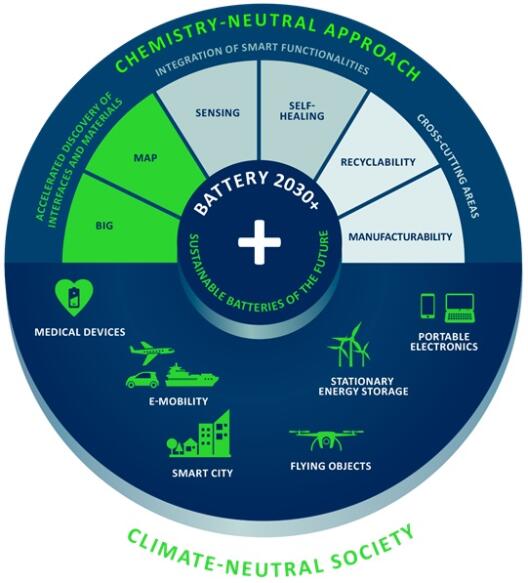BATTERY 2030+ starts Next Phase towards a Green Society
The European research initiative on Future Battery Technologies, BATTERY 2030+, starts the next phase to develop high-performance batteries for a climate-neutral society. The consortium, consisting of Helmholtz Institute Münster (HI MS) of Forschungszentrum Jülich, MEET Battery Research Center at the University of Münster and other partner research institutions, will coordinate and monitor the specifically determined research activities contributing to the large-scale project now. Four strategic objectives were designed for the second phase of BATTERY 2030+.

“In the first phase of BATTERY 2030+ a roadmap to develop the next generation of batteries was successfully designed”, says Prof. Martin Winter, scientific leader of HI MS and HI MS explains: “By suggesting European curricula, in electrolyte research for example, we want to contribute to competence building in the battery community.” Her colleague Dr. Richard Schmuch from MEET adds: “Communication, dialogue and cooperation on cross-cutting topics between the different actors of the battery value chain are key factors to a successful project.”
The strategy of the next phase of BATTERY 2030+ is based on four objectives
1. Implement and monitor research activities
In collaboration, the partner institutes identify and define Key Performance Indicators (KPI) to monitor the results of the research projects contributing to the BATTERY 2030+ initiative. The European Technology and Innovation Platform ETIP Batteries as well as other relevant European institutions will be involved in the discussions and specific project meetings are organized to increase synergies.
2. Maintain and develop the battery roadmap
The BATTERY 2030+ roadmap will be continuously updated and developed by mapping ongoing research and innovation activities and identifying emerging obstacles and research needs. The projects partners ensure alignment of related activities in ETIP Batteries Europe and report on relevant activities in national programs and significant international activities, for example, in North America and Asia. New research and innovation actions are proposed.
3. European curricula in battery technologies
Another objective is the identification of training and education needs regarding master programs in Europe as well as life-long learning to contribute to the content of the curricula. Collaborations with the support programme Marie Sklodowska-Curie Actions and the EU wide institution network ERI ALISTORE offer additional opportunities. The initiative aims to increase visibility, engagement and contributions of young scientists to BATTERY 2030+.
4. Communicate the objectives and the achievements
Finally, the new project phase facilitates communication and dialogue by ensuring media presence as well as public visibility of the BATTERY 2030+. An annual conference to communicate results and achievements is planned.
About BATTERY 2030+
In order to bundle their forces, research institutions from nine countries are working together at BATTERY 2030+ to develop the next battery generation. The virtual kick-off meeting for the next phase of the project will take place from October 14th to 15th, 2020. It is coordinated by Prof. Kristina Edström of Uppsala Universitet in Sweden.
For further information about the project please click here.

